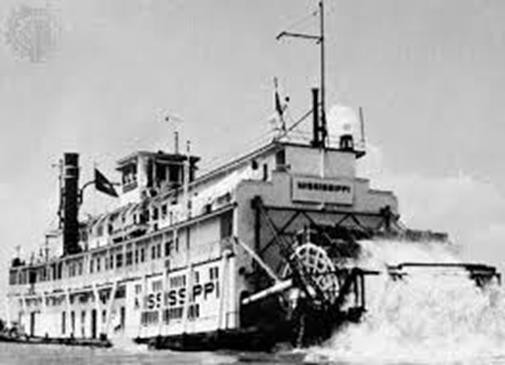We all are aware that insurance is a very important security or guarantee for any ship or cargo owner, when he is in the shipping business. Not only does it deal with the insurance of loss or damage to ships, cargo, terminals, but also against natural calamities or any unforeseen circumstances between the point of origin and the final destination. But, what if, the ship owner realises that he cannot get any claims from the insurance company, despite being a diligent premium payee, and the reason- conditions apply*.

The appellants were The Albion Fire and Life Insurance Company and they were represented by Warner Phipps, who was the secretary for the company in London, and Thomas Hamilton, who was their agent at Glasgow. The other appellants were the directors and the proprietors of the company. The respondents were the proprietors of the steam boat ‘Robert Bruce.’
It is also known as the Bubble Act. This 1720 statute aimed to prevent speculative bubbles by restricting the formation of joint-stock companies without royal charter. In the context of this case, it established a monopoly for sea insurance to certain companies, thereby impacting Albion Insurance Company’s contractual obligations.
The wooden paddle steamer boat Robert Bruce first started her services in 1819 between Glasgow and Liverpool in United Kingdom. Over the later years, she was used to sail on other routes too. On 27th September, 1821, according to the log written by the master Capt. Carlyle, Robert Bruce was set to sail from Liverpool to Dublin (a voyage undertaken by permission of the insurers). She was carrying a crew of 14 along with the Captain, and also had 24 passengers on board the steam boat. Unfortunately, when she had just passed the Great Ormeshead on the same evening, the boat suddenly caught fire. The fire further escalated, as the boilers had some lack of water supply which turned them red hot and ignited the coal simultaneously. Soon, the fire had spread to the cabin and deck of the vessel. Despite this, the Captain and the crew got her to the creek of Cemaes, near Amlwch, Wales. Fortunately, all the passengers, crew and the captain were safe ashore. Attempts were made on September 28, 1821 to salvage the vessel, but a gale made her a total wreck. In the month of July, 1820, the managing owner William Mills of the steamboat ‘The Robert Bruce’, applied for an insurance policy to Thomas Hamilton, who was working as the agent for the Albion company for an insurance of £3000 for himself, other co-owners and for each of the said steam boats.
In 1820, William Mills, managing owner of the steam vessel Robert Bruce, secured an insurance policy worth £3,000 through Albion Fire and Life Insurance Company’s agent, Thomas Hamilton. The policy stipulated coverage for the vessel and another steamboat, Superb. However, it included a critical clause excluding coverage while the vessels were at sea, which was not disclosed to Mills or other owners until after the Robert Bruce was lost to a fire at sea in 1821.
In June 1821, Mills renewed the insurance, paying the required premium. Despite this, the altered clause excluding fire at sea remained undisclosed. Following the vessel’s destruction, Mills filed a claim for the insured sum. Albion Insurance refused, citing the exclusion clause, and offered the policy that specified the exclusion. Mills rejected it, arguing he was entitled to a policy without such exclusions and initiated legal action.
Mills contended the company misled him by withholding vital information about the clause. He demanded the court compel the insurer to deliver a valid policy and pay £6,000 to cover both vessels. Parallel action was also taken against Albion’s parent company, Eagle Insurance Company.
Legal Proceedings and Arguments
Albion Insurance argued their policy was compliant with the 1720 Bubble Act (6 Geo. I. c. 18), which restricted sea insurance to two designated companies: Royal Exchange Assurance and London Assurance. They asserted their contract only covered the vessels in port or harbor and not at sea. However, the statute’s applicability became a contentious point, as the policy was formed in Scotland but executed in London.
Mills’ legal team relied on certificates issued by the Glasgow agent, correspondence with Albion, and verbal assurances, asserting the premium paid was equivalent to full risk coverage. They highlighted that Albion had failed to deliver a policy detailing the sea exclusion until after the claim was made, further undermining their position.
The Judge-Admiral acquitted Albion Insurance, citing insufficient evidence to convict them under statutory provisions. However, the case escalated to the Court of Session, which supported Mills’ arguments, disallowing Albion’s exceptions. The jury returned a verdict in favor of Mills, fixing damages at £3,000. The Court of Session upheld this verdict, deeming it final under statutory terms.
House of Lords Ruling
Albion Insurance appealed to the House of Lords, emphasizing that the 6 Geo. I. c. 18 statute prohibited their coverage for fire at sea and that the contract’s jurisdictional nuances placed it under English law. The Lords dismissed the appeal, ruling the statute’s prohibitive scope did not extend to Scotland in this case. The distinction between English and Scottish jurisdictions played a pivotal role in affirming the Court of Session’s decision.
Implications of the Case
The case underscored several critical aspects of insurance law:
1. Territorial Jurisdiction: Determining which legal statutes govern contracts formed across jurisdictions is vital. The ruling reinforced that Scottish legal principles governed contracts formed there, even if executed elsewhere.
2. Transparency in Insurance Contracts: Insurers must ensure all policy terms and exclusions are clearly communicated to clients to avoid disputes.
3. Maritime Risks and Coverage: The case highlighted the challenges of insuring maritime assets and the need for precise definitions of covered risks.
The verdict serves as a cautionary tale for insurers and insured parties alike. Insurers must align their operations with jurisdictional laws, while policyholders should meticulously review contract terms to safeguard their interests. This landmark judgment continues to inform insurance practices, particularly in cross-jurisdictional agreements.
Insurance policies still consist of jurisdiction clause, which determines where any associated legal claims would be heard. This clause is important because it allows both the parties to avoid certain countries’ courts if they wish, and if it is not mentioned clearly, one could face an expensive and time-consuming dispute over where any claims should be handled. It also avoids the risk of multiple claims happening in different countries at the same time. The jurisdiction can also be either “exclusive” or “non-exclusive”. In this context, “exclusive” means that only the specified courts will be able to hear disputes and “non-exclusive” means the specified courts have jurisdiction to hear disputes but the parties aren’t prevented from litigating in other courts as well.
I am thankful to Dr.S.Mukherjee, an Expert and International Investigator for Maritime Fraud for her advice.
Dr.Soumi Mukherjee completed her Graduation in Mass Media and Masters in Mass Media from University of Mumbai, later completed her Ph.d. She is interested in Investigative Journalism related with History, Geography, Zoology etc. She is currently serving in Media Officer with International Police Organization.


